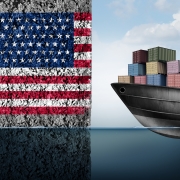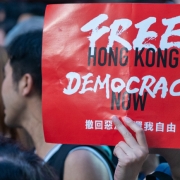There Is An Active, Energetic and Clear-Eyed Populist Patriotism That Rejects Exploitative Elites Of Both Parties.
Populist patriots reject the elites of both parties. They believe President Trump defends their cultural beliefs from the left and their economic interests from the right. They see open borders, illegal immigration and multiculturalism threatening to redefine what it means to be an American, while unfair trade and a rigged tax code endanger their jobs.
The rejection runs both ways. Elite liberals too often talk about patriotism as if it’s a set of blinders preventing Americans from recognizing their country’s flaws. Likewise, conservative elites can be too concerned with boosting gross domestic product, dismissing patriotism as a trifle to be set aside when there are higher investment returns to chase or markets to open.
The divide between these patriots and the left, in particular, is growing. Barack Obama called himself a “citizen of the world” and noted he only believed in American exceptionalism to the extent that the “Brits believe in British exceptionalism and the Greeks believe in Greek exceptionalism.” Even more telling was Michelle Obama’s comment that her husband’s campaign made her “proud of my country” for the “first time in my adult life.” One need not perceive the hand of Providence in America’s Founding and ascendance to reject the Obamas’ tepid faith in this country. Yet even Mr. Obama’s arm’s-length embrace of American exceptionalism would prove too close, too warm for today’s progressive Democrats.
They look at America and see only its failure to live up to its highest ideals. In their eyes, this isn’t a country that has provided more freedom and opportunity to a greater number of people than any other; it’s a society hopelessly riddled with social injustices like racism, sexism and classism. Their prescription is radical restructuring rather than incremental reforms.
Rep. Alexandria Ocasio-Cortez and her “Squad” seem to think their criticisms prove their love of country. But even the most fervent patriots allow for improvement. Progressives might be more convincing if they were more evenhanded—spending some time extolling America’s virtues rather than hammering away at its shortcomings. Populists have grown frustrated with liberal celebrities, journalists and politicians they see as insufficiently thankful for the opportunities America has provided them—one reason Mr. Trump’s defense of the American flag and condemnation of Colin Kaepernick’s refusal to stand for the national anthem have resonated with these voters.
Populist patriots are equally disappointed with the results of decades of Republican economic orthodoxy. Freely flowing American capital builds factories around the globe, raising many people’s quality of life. But this arrangement fails to deliver clear benefits to America’s working class. These voters went along with lower taxes, free trade and other conservative economic positions because they believed, for a time, that these policies would generate more jobs for Americans.
Eventually, many Americans saw enough real-world evidence to doubt that economic vision. Automation and foreign competition led to layoffs, and while some new higher-paying domestic jobs were created in value-added advanced manufacturing, they weren’t distributed evenly by geography or skill level. Cheaper products at Walmart weren’t sufficient compensation for lower wages and fewer hours. Only in the past few years have jobs become plentiful enough to support healthy wage growth, especially for the least skilled.
America’s “forgotten men and women” see Mr. Trump fighting back against Chinese intellectual-property theft, currency manipulation and limits on foreign ownership after years of bipartisan capitulation to Beijing’s perfidy. Rebalancing trade is one of the few policy solutions Mr. Trump has articulated consistently and passionately for decades. He views trade wars the way conservative elites view entitlement reform—as a salutary exchange of short-term costs for greater long-term benefits. And, it should be noted, so far he’s been more effective than more-doctrinaire economic conservatives in advocating long-term thinking. Witness the farmers who patiently affirm their trust in Mr. Trump even as they take a big financial hit from tariffs.
The world-wide movement of millions of people out of poverty has been a remarkable achievement of market liberalization. Meanwhile, for far too long working people’s wages here in America remained flat. And when radical Islamist terrorists threaten the U.S., it isn’t the globalists or glitzy multilateral institutions that defend American families—it’s our fellow Americans, mostly the sons and daughters of the working and middle classes. They’re the ones deployed to neutralize terrorist threats and protect the world’s trade routes.
Populist patriots hear President Trump say “America First,” and think: “It’s about time.” For them, it’s common sense that the U.S. government should value American lives more than the lives of foreigners and U.S. companies should deploy more capital domestically than internationally. Patriots cheered former Rep. John Delaney’s debate line, “There is no reason why people who invest for a living should pay less [in taxes] than people who work for a living.”
Democrats alienate populist patriots with their cultural liberalism and attacks on American identity and symbols; Republicans drive them away with their embrace of free trade and rhetorical emphasis on corporate earnings. Mr. Trump has won their allegiance by pioneering a populist message that melds cultural and economic components. It is the reason he has been able to attract former Sanders and Obama supporters—a feat conventional Republicans would struggle to achieve.
Who after Mr. Trump can win over populist patriots? The answer depends on whether it will be easier for Democrats to slay the Nemean lion of cultural snobbery or for Republicans to muck the Augean stables of economic orthodoxy. But one thing is certain—somewhere out there, a young Hercules is up to the task.
Mr. Jindal served as governor of Louisiana, 2008-16, and was a candidate for the 2016 Republican presidential nomination.





